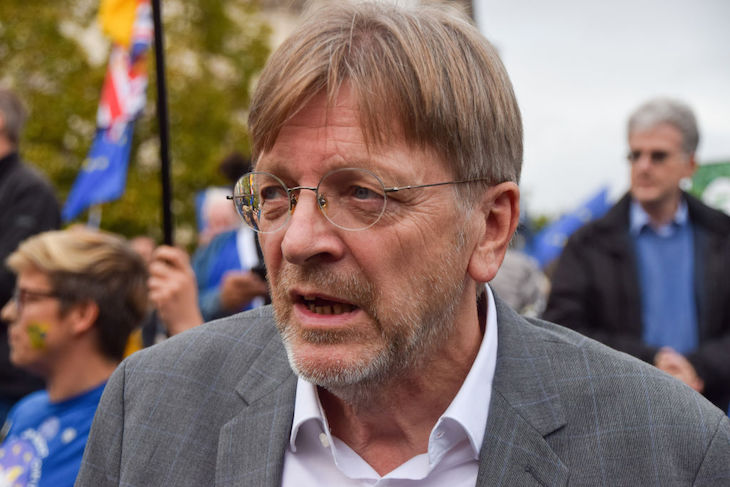During the run-up to the referendum, some ardent Remainers attempted to brand the EU as a Great European Peace Project. Chuka Umunna, the former Labour MP turned investment banker, pushed this line in a radio debate I took part in with him. I made the usual pro-Leave point about Nato being the key international body guaranteeing peace in Europe, but conceded that Germany and France having a joint political project to focus on may have made a useful additional contribution. This enabled the additional point to be aired that the idea they would start a war against each other should the UK leave the EU was preposterous. Being a generally reasonable fellow, Umunna conceded as much and the debate moved on to other areas.
Other than when David Cameron appeared to suggest in the campaign proper that Britain’s departure might hasten the onset of World War Three and was roundly mocked as a result, this aspect of the Brexit argument never really took centre stage.
But more than six years after the referendum – and exactly three years after our formal departure from the EU – there are still pro-Brussels voices to be found who will stretch the point to absurdity.
Guy Verhofstadt, the former Belgian PM, long-serving senior MEP and true believer in the European Project, this week doubled-down on Dave’s mid-campaign hyperbole by suggesting Brexit may have led to the war between Russia and Ukraine. He told LBC:
‘A united Europe certainly on defence matters would make an enormous difference. I think maybe that without Brexit, maybe there was no invasion. I don’t know.’
This claim is such a stretch that it is hard even to fathom what transmission mechanism Verhofstadt has in mind that could have led from 17.4 million British votes to Leave in June 2016 to Russian tanks rolling across the Ukraine border in February 2022.
Possibly he is seeking to argue that just the spectacle of Europe’s two leading defence powers – the UK and France – bickering over EU divorce terms led Putin to think an opportunity was opening up. But if that is the case then how come the Russian leader annexed the Crimean peninsula in 2014 – when Britain was still in the EU and Brexit a remote possibility?
Having mounted that invasion successfully and been faced with a weak response from the major European powers, including Germany’s subsequent ready acceptance of its increasing dependence on Russian natural gas, is a far more likely culprit as we seek to ponder the darkest recesses of Putin’s mind to locate a factor that gave him encouragement.
And neither can it be argued that post-Brexit Britain pulled up the drawbridge and forgot about foreign policy on continental Europe. Quite the opposite. Even many of his biggest detractors will acknowledge that Boris Johnson handled the run-up to the Ukraine war with great skill.
Not only did the UK get vital weaponry into Ukrainian hands before the war, but Johnson’s was easily the strongest voice among European leaders warning Putin about the disastrous consequences for Russia that would follow any invasion. This week we learned that Putin was so irked by these British warnings that he even directly threatened Johnson with the possibility of a missile attack.
Replacing Project Fear with a Project Weird that insults the intelligence of the UK electorate is not going to help putative rejoiners
It is possible the arch-federalist Verhofstadt seriously believes that an established and large EU defence arm could have deterred the invasion given that Nato’s guarantee of protection only applies to its members. But the UK’s departure from the EU actually cleared a hurdle out of the way of such a credible ‘European Army’ emerging. And yet it didn’t and hasn’t – largely because European countries do not generally regard defence as a priority and are content to shelter under an umbrella paid for by Uncle Sam.
Verhofstadt has outed himself as a high-profile sufferer of Brexit Derangement Syndrome: not so much a single issue fanatic as a single entity fanatic, that entity being his beloved EU.
Not having much in the way of antennae for British public opinion – and why would he have? – has led this EU-topian to open a most unpromising front. Even those trying to get an embryonic UK rejoin project rolling and who have sought to blame Brexit for almost any piece of bad news, have not tried this tack.
As Rishi Sunak’s spokesman calmly retorted when asked about Verhofstadt’s absurd claim: ‘Putin’s illegal invasion has nothing to do with Brexit.’
Replacing Project Fear with a Project Weird that insults the intelligence of the UK electorate is not going to help putative rejoiners get their show on the road.
Those who of us who believe in an independent, self-governing United Kingdom may find Verhofstadt’s occasional spectacular interventions grating in the extreme. But we should never wish them to cease. More please, Guy.







Comments